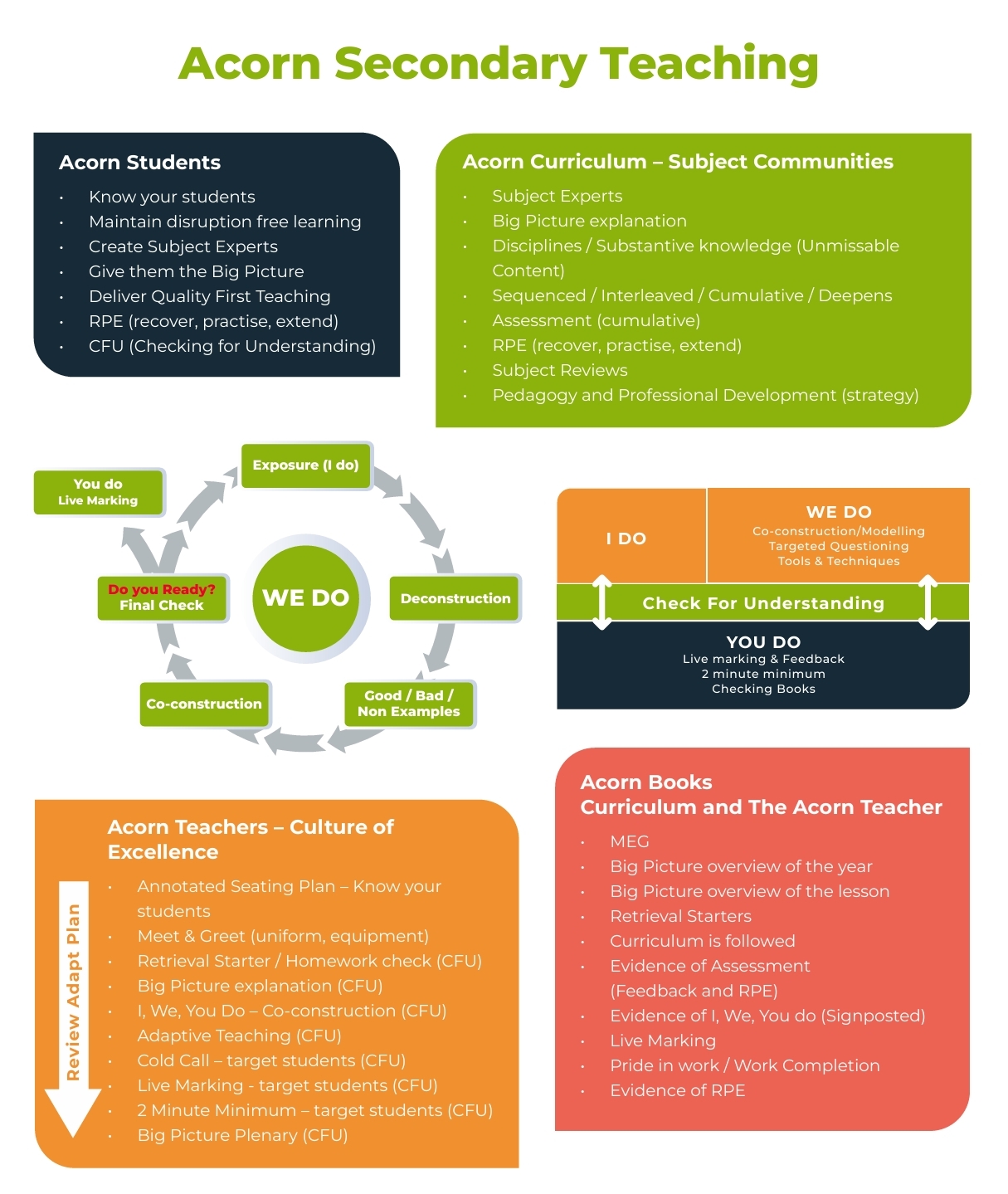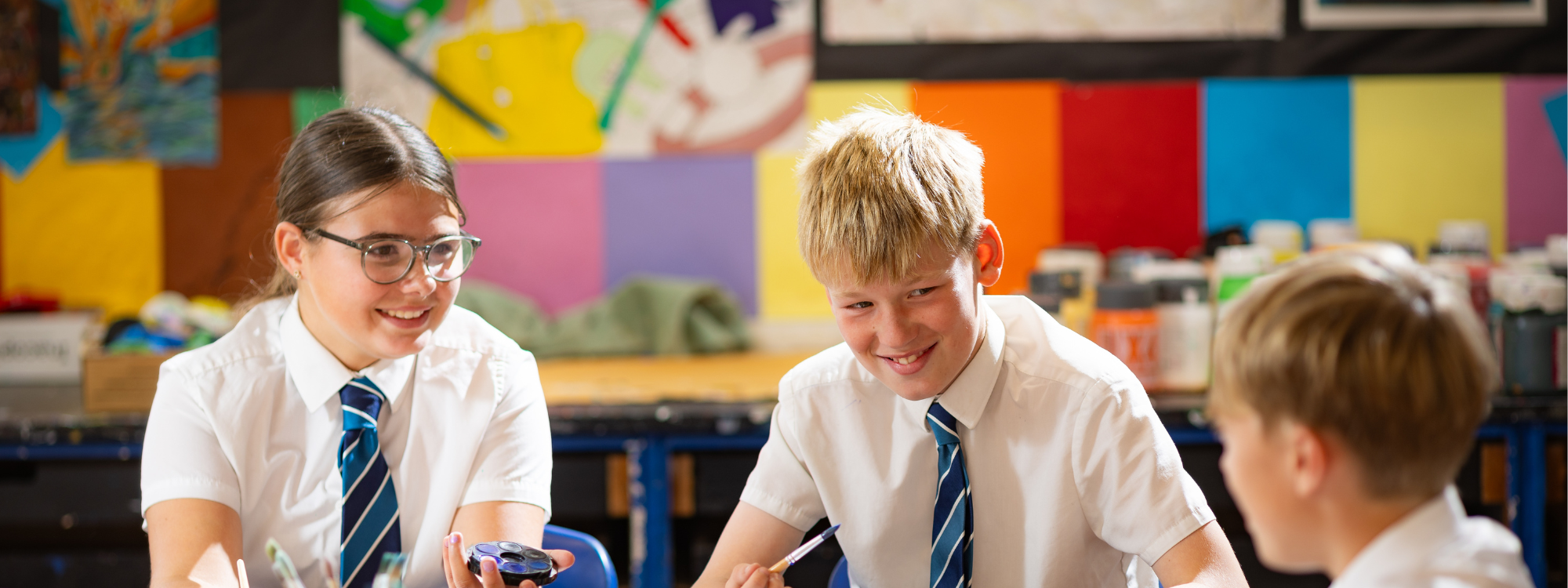Our Secondary Curriculum
What are the shared aims of our curriculum?
There are three shared aims that our teachers and school leaders have sought to reflect in the curricula they have designed in each subject:
First Aim: To create subject experts
In each subject, we teach students how to think, speak and write like experts.
We don’t just want students to know about Geography; we want them to become Geographers. We don’t just want students to pick up a few helpful cooking tips in Hospitality and Catering; we want them to take their first steps towards becoming professional chefs. We believe that this approach will help our students find their vocations and give them the know-how they need to pursue them successfully.
Second Aim: To provide a broad and balanced education
At Key Stage 3, our students study a wide range of subjects, ranging from academic subjects like Mathematics and History to more vocational subjects like Dance and Product Design. Although students narrow their options at Key Stage 4 and again at Key Stage 5, we allow them to choose freely from this same wide range.
In each subject, students learn about a wide range of topics, issues, ideas, approaches and skills. However, we aim to balance this breadth with depth, allowing students sufficient time and opportunity to master what they are learning before they move on to new things.
Third Aim: To make students aware of the ‘big picture’
We believe it is important for all students to know and be able to explain what they are studying, why they are studying it, and how they are progressing. This ‘big picture’ is important because it makes students feel empowered and in control of their own learning.
What are the shared objectives that guide the design of our curriculum?
Our whole-school curriculum is designed around five shared objectives that are reflected in each of our subject curricula. This helps to create coherence for our students: they learn in the same way in each of their subjects.
First Objective: Both substantive and disciplinary knowledge are important to create subject experts.
Substantive knowledge is the important things students need to know in each subject. For example, in History, students might need to know the names of the men who wanted to claim the throne of England in 1066; in Biology, they need to know that
6CO2 + 6H2O → C6H12O6 + 6O2. This is important because all experts need to know a body of information about their subject.
Disciplinary knowledge is how we think about these important things in each subject. It means teaching students how to collect, use, link together and be critical of facts, ideas and approaches, just like an expert.
For example, in Geography, students might learn about processes of erosion like abrasion, corrosion, corrasion and hydraulic action that happen along our coasts. This is substantive knowledge: each of these processes represents something that is important to know in Geography.
After learning about these processes and other features of coasts, students may be asked to predict how a specific coastal location might change in the future. To do this, they will need to use their knowledge of erosion, as well as other things like rock types, to estimate how quickly some coastal features like cliffs may gradually disappear, but also how other features like beaches may grow or even appear for the first time. This is disciplinary knowledge, because it requires students to link together the things they have learnt and use them to make educated predictions about the future, just like an expert or Geographer.
Second Objective: All students have strengths and deficits in their knowledge that need to be reflected in our subject curricula.
No student arrives at secondary school as an ‘empty vessel’: They all possess some knowledge about each of the subjects that they will study, although the breadth and depth of this knowledge varies a lot. Similarly, as students’ progress to from Key Stage 3 to 4, or from Key Stage 4 to 5, they will possess strengths and deficits in each of the subjects they choose to continue with. We believe that identifying our students’ strengths and deficits at each point of transition is important because it allows their teachers to pitch learning at an appropriate level of challenge.
Third Objective: Learning needs to be interleaved for students to know more and to remember for longer.
Interleaving is an approach where students are presented with the same knowledge at several different points across a given period of time. The length of time between these points typically grows longer as students become more able to recall the knowledge they have acquired, although this can also vary according to how complex the knowledge is, how much there is of it, and how important it is. A wide range of research from education and neuroscience shows that spaced learning is important because it helps students learn more and remember it for longer.
Fourth Objective: Becoming an expert requires students to learn and be assessed in a way that is cumulative.
Through adopting an interleaved approach to substantive and disciplinary knowledge, our students learn in a way that is cumulative: they learn more and more about each of the subjects that they study, which gives them the tools they need to think, speak and write like an expert.
To measure the progress that students are making in this journey towards becoming experts, we have to assess them not just on what they have learnt recently, but also on what they have learnt throughout their course of study. So, for example, an assessment on the causes of the English Civil War in History will not just test students on their knowledge of this specific time period, but also what they learnt about monarchy and how former kings and queens of England used their power before this event.
Fifth Objective: There is unmissable content in each subject that every student needs to know.
Although all the knowledge covered in our subject curricula is important, some is unmissable: Without it, students may struggle to make progress towards becoming an expert, or to see the ‘big picture’ in a particular subject.

Absence
All students can face unexpected periods of absence that can create gaps in their learning. We know that students who experience socio-economic disadvantage or are vulnerable for other reasons are likely to have lower rates of attendance than their peers. This means that all students, but especially the most vulnerable, are at risk of missing out on learning this unmissable content.
To ensure that all students cover the unmissable content in their subjects, but also that there are frequent and meaningful opportunities to work with such content, we plan opportunities for students to Recover, Practice and Extend (RPE) into the curriculum:
Recover (R): This is where teachers teach unmissable content for those who missed out on it the first time.
Practise (P): This is where teachers give students opportunities to revisit and improve their ability to remember or use unmissable content.
Extend (E): This is where teachers give students who already have a good understanding of the unmissable content to work with it in a more challenging or complex manner.




